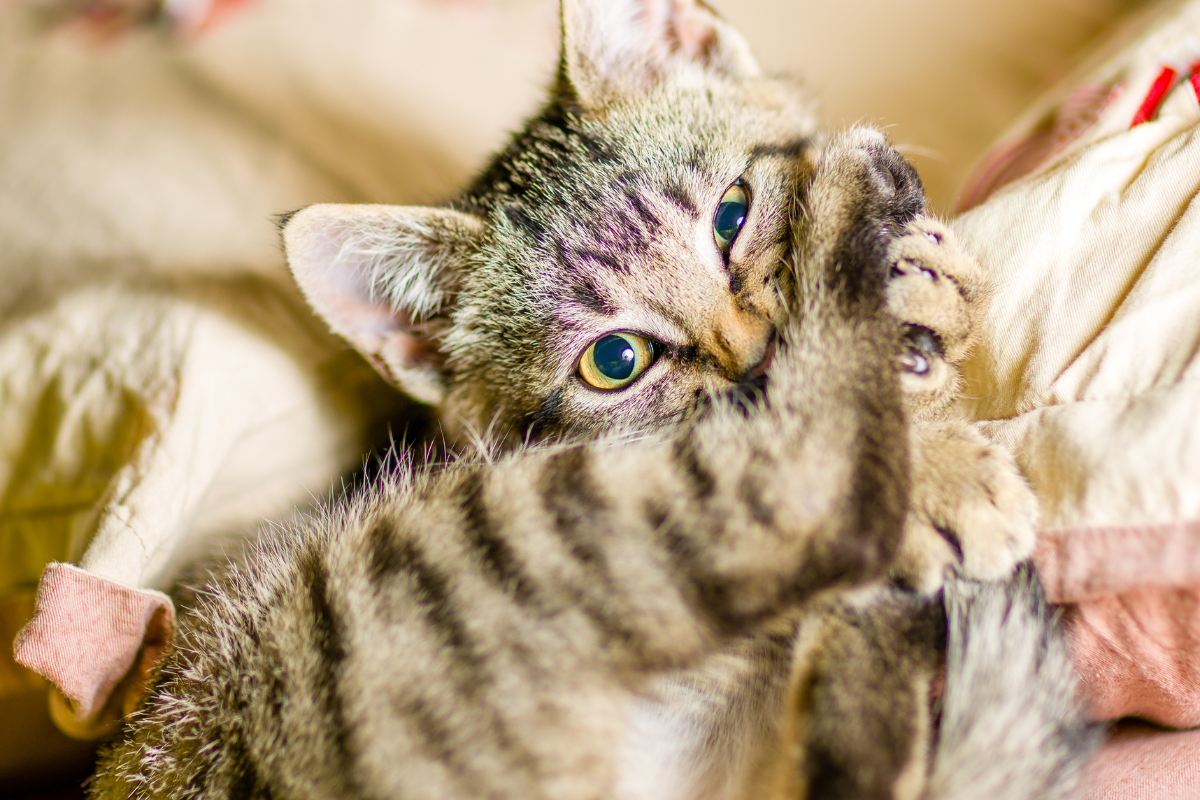Common Symptoms and Causes of Skin Conditions in Pets
Food allergies are not very common in pets. Food intolerance can mimic food allergies and create the same or similar reactions. The most common pet allergies are caused by fleas and inhalation of environmental substances such as pollen and dust mites. Both food allergies and intolerances are considered “adverse food reactions” by veterinarians. Itchy skin, fur loss, red, irritated, and flaking skin are some of the symptoms of adverse food reactions.
Mild and severe (though uncommon) allergic reactions are identified by hives, and swelling of the eye area, muzzle, and lips. Severe allergic reactions can cause life-threatening anaphylaxis. Therefore, if you notice any of these symptoms, it’s essential to contact us immediately.

According to, most dogs and cats will become itchy if bitten by fleas, but some have allergic reactions to flea bites that result in flea allergy dermatitis. (FAD) Even a few bites from these parasites can cause intense and long-term itching for pets with FAD. Symptoms to look for are hair loss, raised bumps, redness, excessive grooming, licking, and scratching. The skin may be raw and bleeding. Cats commonly display symptoms around their neck and face, while on dogs, it’s more likely to be noted near their back legs, stomach, and tail.
Just because fleas are not visible does not mean they aren’t there. Our mobile vet clinic can diagnose and treat your pet if your cat or dog has fleas. Using year-round flea treatment and flea prevention medication will help put an end to your pet’s flea allergies but keeping fleas out of your home is also critical in breaking the cycle. Pets that go untreated can end up with severe skin infections. Ringworm is a fungal condition occurring in both cats and dogs. Don’t use flea treatments, shampoos, sprays, antifungals, or other topical treatments before consulting a vet.
Dry and itchy skin in cats is symptomatic of various environmental factors and conditions. Autoimmune disease in cats can lead to numerous skin problems. Changes in weather, temperature, diet, and under or over-grooming also contribute to dry skin. If a cat is obese or has arthritis, grooming may be difficult. Dry skin symptoms include itching, bald spots, excessive licking, and dandruff. Sometimes these symptoms and conditions overlap, so if your cat has dry skin, it’s important to have a community pet clinic checkup with a veterinarian before treating it at home.
If your dog’s coat is dull, lacking sheen, too greasy or dry, rough and thin, there are underlying conditions similar to those in cats, including fleas and lack of dietary nutrients, which may be the culprit. Shiny dog fur often signifies health and vigor. Poor coat conditions, including mats and tangles that make grooming difficult, are sometimes caused by using dog shampoos that are too harsh and not formulated for dogs’ skin and fur. Human shampoos are not appropriate for pets. If your dog has clumpy patches of missing fur, it may signify severe conditions, including the hormonal disorder Cushing’s Disease. If you notice hair loss in your dog, don’t wait to set up an appointment with a vet. Greasy fur is more than likely related to dietary problems. Make sure your veterinarian gives your pet’s diet the green light.
What to Do If You Find a Lump
If you find a lump under or on top of your pet’s skin, self-diagnosing and panic are the most important things not to do. At Jacksonville Community Pet Clinics, we see many bumps and lumps that are relatively common in older pets, particularly dogs. Some skin masses, tumors, or growths are caused by viruses, environmental exposures, genetics, and hormones, and some have no known cause. They form in a variety of shapes and sizes. The appearance of a growth will give your vet an indication of what type of mass it may be.
It’s frightening to find lumps and growths on your pet. Many are non-cancerous. However, malignant tumors or cancerous masses are sometimes found. Quick diagnosis and treatment (if necessary) are imperative. Be sure to check your pet regularly for masses. This can be accomplished during playtime while bathing your dog or brushing your cat (if they tolerate it). Check them as thoroughly as possible, including the less obvious places like legs, feet, and belly. If an outside service grooms your pet, consult with them regularly so they can let you know if they find anything unordinary.
These barkers just like the sound of their voice and want to share it with the world. Compulsive barking is often accompanied by other annoying behaviors such as running in circles or along a fence line.
Does Your Pet Need Sunscreen?
With summer upon us, it’s an expected time of year to include pets in more outdoor activities. This raises a fairly popular question about the use of sunscreen on pets. According to the ASPCA, skin cancer can occur in pets, but that doesn’t mean using sunscreen is the best option. Cats and dogs with lighter-colored fur are predisposed to skin cancer in multiple areas around their face and head. Limiting pets’ exposure to the sun during peak hours when the sun is brightest may be a better option for sunscreen. Just because something is labeled “pet-friendly” doesn’t mean it’s safe. The FDA does not test sunscreen products marketed for pets. Additional health problems can arise if pets eat sunscreen, including gastrointestinal upset and allergic reactions. A veterinarian can help you determine what products are needed for your pet while out enjoying the summer sun. Take frequent shade breaks if you have your pet out in bright sunlight. If your pet accidentally ingests sunscreen or causes any reaction, please contact an emergency vet or call the ASPCA Animal Poison Control Center at 888-426-4435 for advice.

Our goal and purpose at Jacksonville Community Pet Clinic is to keep your pets happy and healthy. Regular checkups, pet shots, and focus on preventative care to keep common diseases and sickness from occurring in the first place helps ensure a long healthy life for your pet. We will work with you to create individualized care plans for your beloved fur baby. To learn more, visit www.mycommunitypetclinic.com.


